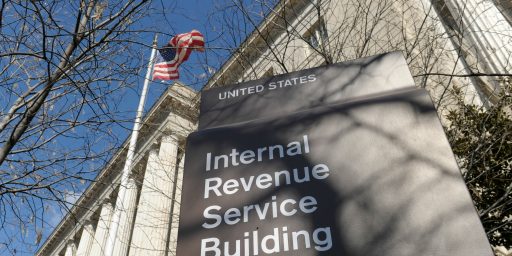IRS Released Confidential Data Of Conservative Groups
Pro Publica reported last night that the IRS had released to it confidential information consisting of applications for tax-exempt status of several conservative organizations:
ProPublica on Monday reported that the same IRS division that targeted conservative groups for special scrutiny during the 2012 election cycle provided the investigative-reporting organization with confidential applications for tax-exempt status.
That revelation contradicts previous statements from the agency and may represent a violation of federal guidelines. Lois G. Lerner, who heads the IRS sector that reviews tax-exemption applications, told a congressional oversight committee in April 2012 that IRS code prohibited the agency from providing information about groups that had not yet been approved.
Reps. Darrell Issa (R-Calif.), chairman of the House Oversight and Government Reform Committee, and Jim Jordan (R-Ohio) had asked Lerner in March 2012 to provide a list of all organizations that the IRS had subjected to special scrutiny.
Lerner replied that she could not legally reveal information about groups that were not approved and that identifying targeted applicants that were already approved would require additional work, specifically a “manual review of each file.” She did not identify any of the organizations.
Below is an excerpt of Lerner’s response:“Section 6104(a) of the Code permits public disclosure of an application for recognition of tax exempt status and supporting materials only after the organization has been recognized as exempt. Consequently, we cannot provide a list of organizations that have received [additional scrutiny] from the IRS, until those applications have been approved.”
ProPublica reported that the Lerner’s division released “nine pending confidential applications of conservatives groups” in response to a request from the investigative-reporting organization for the applications of 67 nonprofits in November 2012.
This is separate and apart from the story that was made public last Friday about the targeting of conservative groups, appears to clearly violate established IRS procedures, and may also violate Federal Law. This story isn’t going to be going away for awhile.




I think you missed one of the key points in that story, Doug. All of the information they received illegally was for conservative or libertarian organizations. None was for a liberal or progressive organization.
@Dave Schuler:
Not only that, but it all originated *out of the same office.* If this had been a different section of the IRS, I suspect that this would have been easier to explain away.
But as more and more keeps coming out of the same location, its tougher to argue that this wasn’t a coordinated effort (at least at the local level) and that there wasn’t a significant oversight failure.
One thing that’s worth holding onto…
This was in response to a public request. So it wasn’t exactly a 1:00am secret email. The question remains as to whether or not this is simply a case of incompetence (not understand the rules) or intentional/criminal malfeasance.
Of course, incompetence isn’t a good defense, but it sets up a different situation than the other possibility.
@matt bernius:
Not sharing confidential data should be a pretty basic rule for the IRS, so I find it hard to chalk handing this information over to ProPublica, in light of everything else, as a simple mistake.
@Dean:
For the record, it should be noted that (a) some of ProPublica’s requests were denied, (b) 22 groups had received approval, meaning that their documentation was public, and (c) upon realizing the mistake, the IRS told ProPublica not to disclose information about the remaining 9 groups.
Unfortunately, ProPublican does not mention how many of the 9 applications that should not have been released ultimately passed. At least one of them — Crossroads GPS — was ultimately approved.